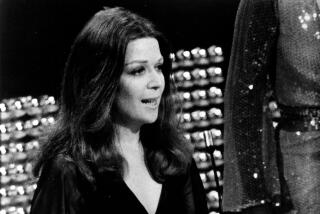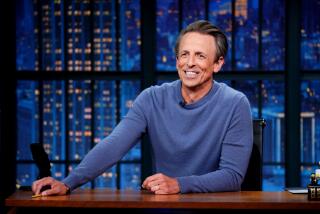Enough about me, says Eisner to his TV guests
- Share via
An hour before the Monday lunch crowd would arrive, Michael Eisner, the former chief executive of Walt Disney Co., and Billy Crystal, comic and memoirist, had the entire back dining room of Spago restaurant in Beverly Hills to themselves -- along with the crew and cameras of CNBC’s “Conversations With Michael Eisner” and a mini-entourage.
Foreheads matte with makeup and powder, the two faced each another in a dining booth. Eisner confessed he was “obsessed” with Crystal’s stage production “700 Sundays,” a comic and dark exploration of how his father had affected his life. Even when the conversation took a turn, Eisner would bring it back to the play, listening with an almost beatific smile. Crystal called the attention “thrilling.”
For this third episode of his prime-time talk show on the business network (to air May 25), Eisner had chosen Crystal, along with Bob Iger, Eisner’s replacement at Disney; ABC talk show host Jimmy Kimmel and Sharon Stone, who ended up canceling her appearance just days before, even though the former mogul had spent the previous weekend preparing for the interview by watching her movies (“I’ve never seen so many orgasms in five hours in my life,” he said.)
He’d also reviewed movies and television tapes from Crystal’s career and read his memoir, based on the play. “He does his homework,” Crystal said. “I was on the ‘Today’ show with a kiddie book. That was 32 pages I wrote! Katie had not read it! What would have been so hard?”
Eisner, in a suit and tie and a shirt whose collar couldn’t be crisper or whiter, said he’s comfortable out of the boardroom and on this side of the cameras.
“I’m only doing what I think is fun and interesting,” he said. “Once the camera rolls, I forget there are people around, I’m just into a conversation.” Sometimes, that means he talks more than a host normally does, or gestures too much. But that’s OK too, because “they cut that back in editing.”
In his role as host, Eisner books his own guests, who have included Goldie Hawn, Regis Philbin, Bette Midler and Martha Stewart who, like Crystal, responded in thoughtful and practical ways apart from their celebrity personae.
On his first show, Eisner looked mildly amused when Philbin tried to offer him some advice on hosting. (Stress the raconteur side, repress the shark side.)
“Most of the advice I’m being given by all my experts, mainly my family and my friends, is not what I think I should be doing,” Eisner said. The show’s strength, he said, comes from the personalities of the guests and the host. “If I get too many restraints on my personality, I’m going to end up being just another talking head. I’d rather err and be me. If being me isn’t attractive or interesting enough, then I’m not going to continue being me on the air.”
Some might say he’s lucky to have that choice. Eisner’s second show averaged 66,000 adults between 25 and 54, up from 39,000 for the premiere. If he were the executive in charge of his own show, he said he didn’t know whether he’d keep it on the air.
“You have to think about where it would go.” On the plus side, he noted his viewers do have unusually high incomes.
Eisner, 64, fell into talk show hosting after the long-running “Disney wars” resulted in his resignation in September. Talk show host Charlie Rose asked him what he would do next.
“I said, ‘Maybe I’ll do what you’re doing.’ ” The next month, Rose asked him to fill in as a guest host. He booked his old friends, actor John Travolta and media mogul Barry Diller. Soon after, CNBC offered him his own show. “I said I’ll try six and see if I like it.”
So far, he says he likes much of it. “What I don’t like is coordinating the schedules.” Normally, Eisner’s monthly show is taped in New York. He’s busy with worldwide speaking engagements and a new business involvement with the San Diego-based Veoh Networks (which delivers online programming) and he must find a time when both he and his guests are in town. CNBC producers suggested an L.A. special might be more convenient for Hollywood-based guests, and so Eisner called his friend Wolfgang Puck, who turned over the salon in his restaurant.
A notorious micromanager, and proud of it, Eisner said he had done what he needed to do to “set the level of excellence” he wanted for the show, so an L.A. experiment was fine with him. “I’m still going to use the home base as the main place, but occasionally [tape from] here, France, wherever the people are that we want to talk to.”
If the show continues, he said he’d like to interview French president Jacques Chirac. But not necessarily about politics. As an interviewer, he said his goal wasn’t to make news but to “understand the creative process.”
He said he liked to ask people about things he’s interested in and knows the person hasn’t talked much about yet.
He hopes to reschedule Stone, for example, because she represents the modern equivalent of Elizabeth Taylor in “Cat on a Hot Tin Roof,” which he and his friends went wild over in their teens.
“I was interested in a woman who 10 years ago represented beauty to the world in the same way a woman did 50 years ago. I wanted to ask her, did she understand what that meant?”
Executive producer Jim Deutch, who has known Eisner for 20 years, said he was naturally curious about people. “Even when I was a kid, he’d ask a million questions. I’d think, ‘Why are you interested? I’m only 16.’ ”
More to Read
The complete guide to home viewing
Get Screen Gab for everything about the TV shows and streaming movies everyone’s talking about.
You may occasionally receive promotional content from the Los Angeles Times.






